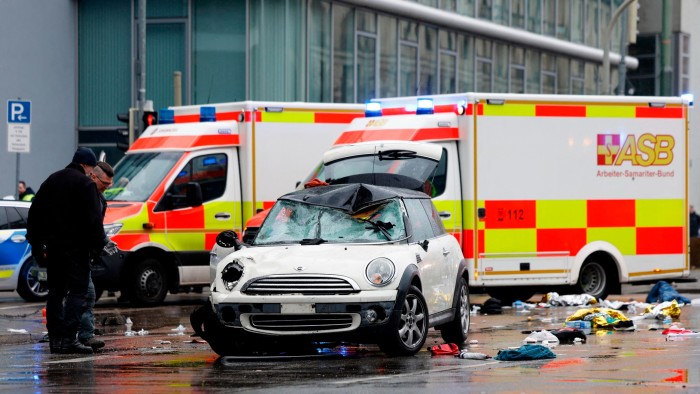Unlock the Editor’s Digest for free
Roula Khalaf, Editor of the FT, selects her favourite stories in this weekly newsletter.
More than two dozen people have been injured after a 24-year-old Afghan man drove into a crowd in Munich, marking the third attack by an asylum seeker in Germany in three months.
The incident, which comes just over a week before federal elections on February 23, left at least 28 people injured.
Police said that the attack appeared to be deliberate, describing how the car had driven behind a protest organised by the trade union Verdi, before overtaking an accompanying police car, accelerating and driving into the protesters.
They said that they had detained the driver of the vehicle, a cream Mini Cooper, and that he no longer posed any threat to the public.
The attack, which comes as senior officials from around the world prepare to gather in the city for the annual Munich Security Conference, follows two other, fatal attacks by asylum seekers that have overshadowed the German election campaign and derailed attempts by mainstream parties to focus on the country’s stagnating economy.
In December, an exiled Saudi doctor drove into a Christmas market in the city of Magdeburg, killing 6 and injuring around 200 others. Last month, an Afghan national suffering from psychiatric problems killed a two-year-old boy and an adult in Aschaffenburg.
Those attacks helped propel migration to the top of the political debate, and prompted Friedrich Merz, the Christian Democrat leader and frontrunner to become the next chancellor, to take the unprecedented step of relying on the far right to push through a call for tougher migration rules through the Bundestag.
The Alternative for Germany (AfD), which takes a hardline stance on migration, is on track to secure a historic second-place finish with around 20 per cent of the vote.
Speaking at the scene of the attack, the Bavarian prime minister Markus Söder — a member of the CDU’s sister party the CSU — said that there must be consequences.
“We can’t just go from attack to attack and [simply] show concern,” he said. “Something has to actually change.”
Read the full article here




